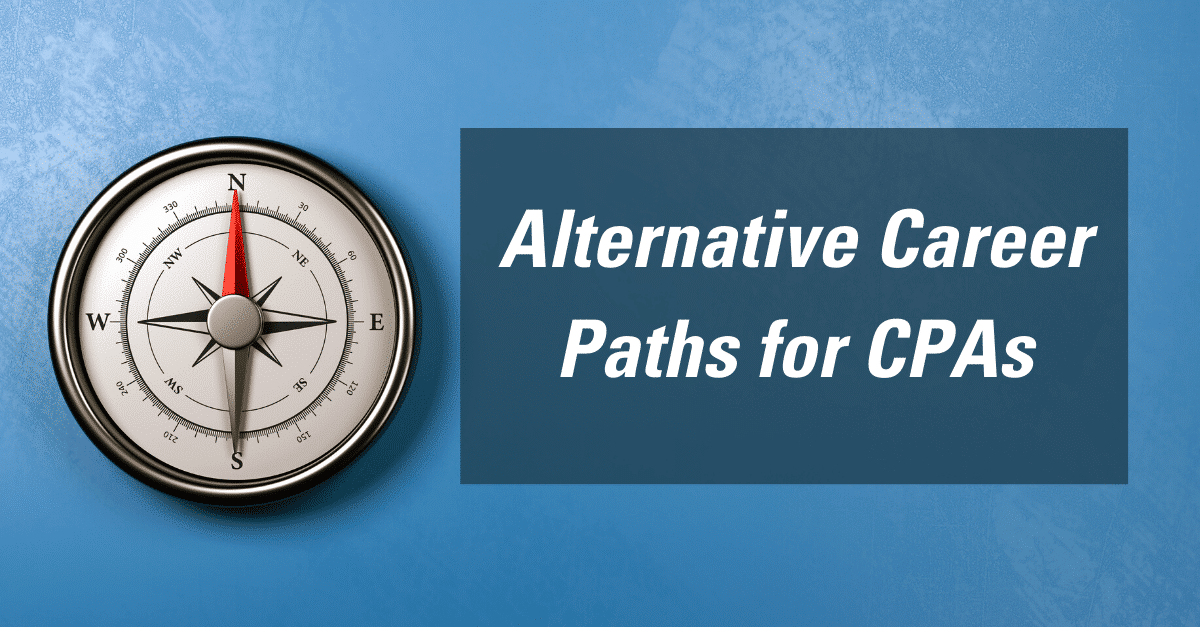Careers for CPAs can seem pretty cut and dry: get your accounting degree, pass the CPA Exam and then start out as an entry-level staff accountant in public and work your way up, or switch over to industry at some point. However, the skills required to pass the CPA Exam and become a CPA, and the prestige that comes with the credential open up plenty of doors and career options for non-traditional professions. If you want to venture out of the standard CPA role, check out these six alternative career paths for CPAs – or watch the video below.

Federal Bureau of Investigation
Every business needs accountants, and the FBI is no different. Plus, being a Certified Public Accountant exempts you from the FBI entrance exam. CPAs can work as special agent accountants or in staff forensic accounting positions. Working for the FBI is very investigative, and you’ll likely be digging into white-collar crime, such as tax fraud, money laundering, embezzlement and counterfeiting in a fast-paced work environment.
The FBI looks for CPAs in the United States with one to three years of professional accounting experience who can pass a background investigation and who are in good physical and mental health. Income is competitive, with an average salary of $73,000.
Forensic accounting
Not only is forensic accounting off the career path of a traditional CPA, it’s also a fast-growing field with a multitude of career options and opportunities. Forensic accountants use the standard accounting principles but analyze tax and business records and look for evidence of financial crimes. They can then use this evidence to testify in criminal and civil cases. They can work in state or local law enforcement, the FBI, the Secret Service or on behalf of public accounting firms or private corporations.
The CPA credential is often a requirement to become a forensic accountant, as it shows you have the discipline and expertise for the position. The field is growing quickly, and the Bureau of Labor Statistics (BLS) projects employment to grow 11% for all accountants between 2014 and 2024. Forensic accountants have an average salary of $67,190.
Fraud examination
Certified fraud examiners are a subgroup of forensic accounting; they gather evidence to judge whether or not fraud was committed and use the CPA skill set to do so. There is a heavy placement on learning the laws around fraud, and examiners need to know both why fraud occurs and how to resolve fraud allegations.
Similar to forensic accounting, the field is growing rapidly as white-collar crime becomes a larger issue in the public, private and political landscape, and public firms add more fraud examiners to their staff. The position generally requires the CPA credential and several years of experience to guarantee in depth accounting skills.Those who wish to become fraud examiners must also earn their Certified Fraud Examiner designation. The average salary is attractive at $81,690.
C-suite executive
If you have dreams of working at the top, having a CPA credential will help you up the ladder. C-level executives include job titles like Chief Executive Officers (CEOs), Chief Financial Officers (CFOs), Chief Operations Officer (COOs) and Chief Information Officer (CIOs). As companies grow to become more responsible, Chief Sustainability Officers (CSOs) have also cropped up as a C-suite position.
Getting your CPA license requires wide reaching skill sets, including accounting, finance, compliance and ethics, making CPAs ideal candidates for life at the top. The career path to a C-suite position generally involves at least 10 years of experience and having knowledge of strategy, operations and finance. In 2012, the global average C-suite salary was $278,800, not including benefits and perks.
Accounting consultant
Accounting consultants need to be able to go in depth in a range of accounting jobs, like financial statements, including preparing, reconciling, analyzing, interpreting and communicating findings to clients. The professional accreditation provided by the CPA prepares consultants for these immense responsibilities, and creates trust with clients and regulating authorities. Consultants need to manage financial data, help develop accounting systems and enforce financial compliance.
Consultants can work with businesses large and small, and their specialized skill set is increasing in demand as businesses try to lean out bottom lines while also being more responsible. Consultants can work for themselves, for public accounting firms, or for a consulting agency. The average salary for an accounting consultant is around $89,160 per year.
Start your own business
The combination of skills a CPA has puts them in the perfect position to start their own business. Entrepreneurs can work as consultants or work as tax or accounting professionals. They may choose to work with individuals, small businesses or larger businesses in a variety of industries. It’s a great way for accountants to use their skill set to pursue other passions. The salary range for an independent CPA depends heavily on how large the business is and the clients it serves.
Next time you’re not sure if you want to go the traditional CPA route, remember these alternative careers for CPAs in the accounting field. The credential requires a diverse skill set and opens career pathways in a variety of fields and industries; you’re sure to find the perfect fit for you.
Liz Kolar, CPA, CGMA, has been teaching CPA Review for more than 25 years in the United States, has personally taught more than 2,500 live sessions, and has helped thousands of candidates pass the CPA Exam. She founded Pinnacle CPA Review and co-founded Surgent Kolar CPA Review.





